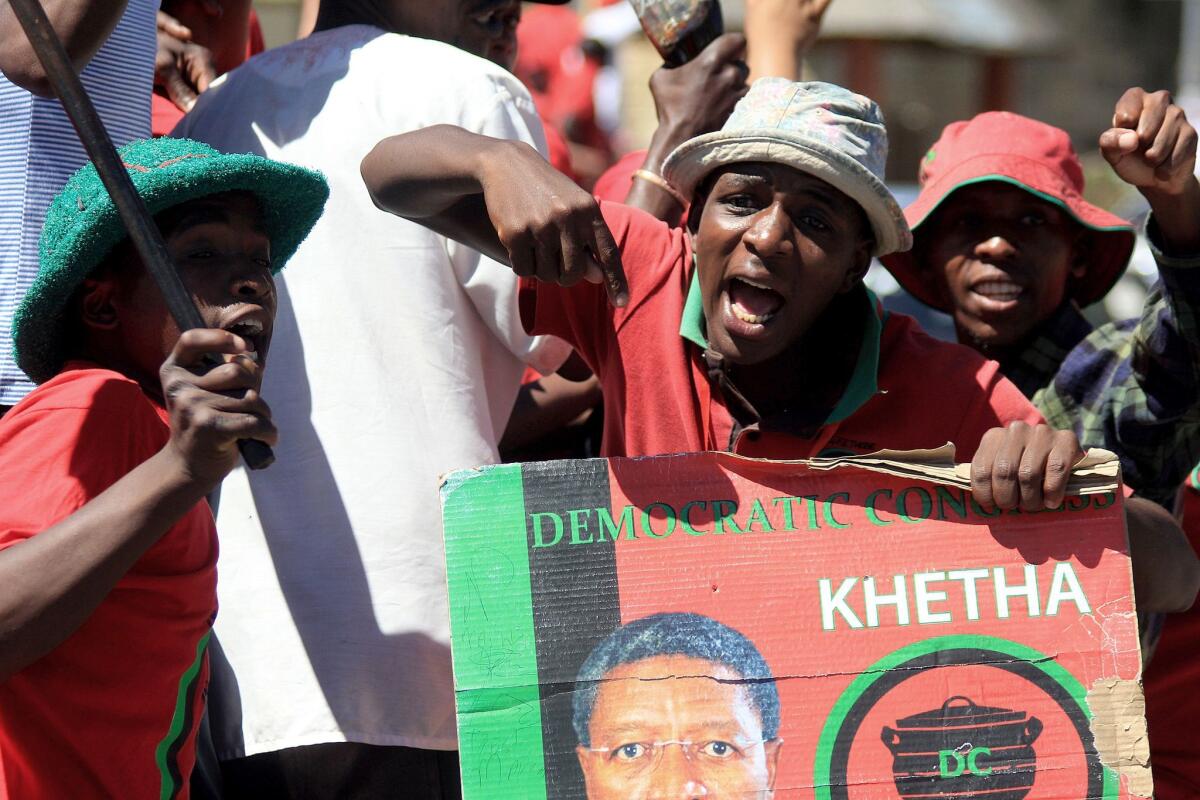In Africa’s Lesotho, election results suggest continued instability

- Share via
Reporting from Johannesburg, South Africa — The southern African mountain kingdom of Lesotho appears headed for a new coalition government after an election that analysts said failed to heal deep divisions that surfaced in a failed coup last August.
The first move of the new coalition leader, Pakalitha Mosisili, was a case in point: a divisive announcement that he would reappoint the military commander who launched the coup attempt.
His move suggested that the military and police, which were aligned to rival political forces last year, will be as politicized as ever, a factor that could prolong the country’s instability.
Also contributing to likely continued volatility is the fact that no party won power outright, leading to furious horse trading as rivals jostled to form a government.
Mosisili cobbled together a coalition of seven parties, including his Democratic Congress, giving him a thin four-seat majority in parliament and earning him the right to govern.
His party won 47 seats, just one seat more than the All Basotho Convention of his rival, outgoing Prime Minister Tom Thabane, who had appeared certain of victory in recent days.
Thabane recently vowed to punish those responsible for the attempted coup against him last year for destabilizing the country.
The new coalition needed at least 61 of parliament’s 120 seats to govern, and its slim majority underscores the political fragility of the small kingdom, which is surrounded on all sides by South Africa.
The Democratic Congress’ main coalition partner is the Lesotho Congress for Democracy, led by Mothetjoa Metsing, who was deputy prime minister to Thabane until a bitter falling-out last year after the prime minister ordered a corruption investigation into his then-deputy.
The fault line between the military, loyal to Metsing, and police, loyal to Thabane, played out in the coup attempt which followed.
Thabane fled to South Africa for several weeks after the army, under the command of Lt. Gen. Tlali Kamoli, surrounded his residence, attacked police stations and shut down the government television station.
Under a peace deal forged by South Africa last year, Kamoli had to leave the country. However, Mosisili said Wednesday that Kamoli would return as commander.
Like the security services, Lesotho’s civil service is crammed with political rivals who back one party or another.
The country has seen shifting alliances and squabbles among three major political figures: Mosisili, Thabane and Metsing. Mosisili and Thabane were Lesotho Congress for Democracy members who left to form their own parties. In elections three years ago, Thabane’s and Metsing’s parties joined forces to take power, resulting in Mosisili’s defeat as prime minister, before they in turn had last year’s dramatic falling out.
Mosisili, who ruled Lesotho from 1998 to 2012, said the new coalition was determined to work together for the stability of the country and blamed the divisions in the security sector on Thabane.
Political analyst Tsoeu Petlane of the Transformation Resource Center, a nongovernmental organization that promotes peace and democracy, said that with seven parties, the coalition could falter in coming months, as did the last coalition government.
“I would not say this coalition would be more stable than the previous one,” he said in a phone interview. “At the moment we have a coalition of seven parties. The two main parties [in the coalition] have 59 seats, which is just under the 50% needed to govern. Then you have got five other parties, bringing two seats or a single seat each. That means it’s possible for the coalition to be as unstable as the previous one.”
Petlane said the coalition leaders would likely offer positions and perks to minor leaders to keep them from defecting, making it difficult to deliver on a promise to trim government excesses.
Meanwhile, the main threat to the country’s fragile democracy remains the rivalry and destabilization in Lesotho’s security forces and civil service.
“Those divides have not been bridged and the tension has not been negotiated,” Petlane said.
Follow @robyndixon_LAT on Twitter for news out of Africa
More to Read
Sign up for Essential California
The most important California stories and recommendations in your inbox every morning.
You may occasionally receive promotional content from the Los Angeles Times.










